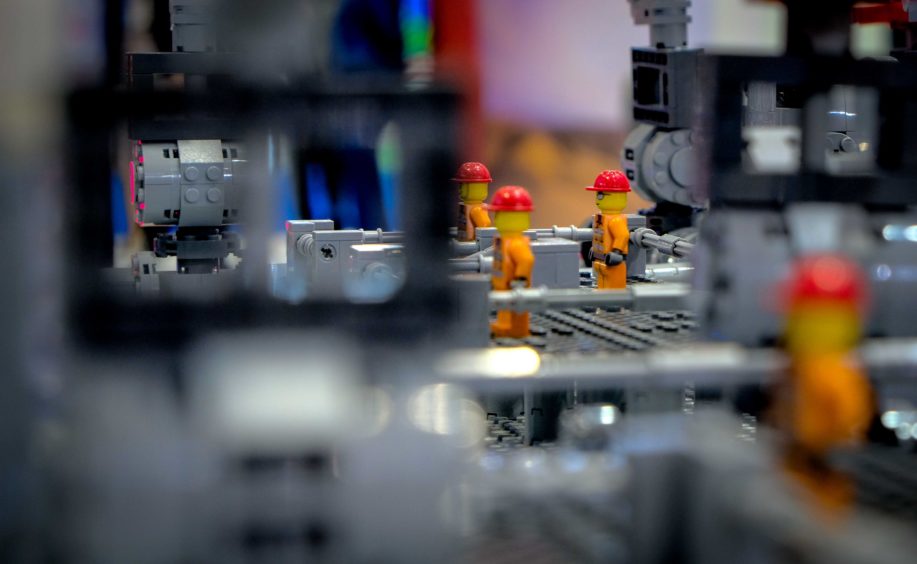
There are opportunities for companies to press ahead with innovation and expansion while using machine learning and big data, ABB’s vice president for digital Ronan O’Sullivan said recently.
“We’ve been supply electrical equipment and automation since the 19th century and as technology has evolved we’ve continued to be at the forefront,” ABB’s vice president for digital Ronan O’Sullivan said to Energy Voice on the sidelines of the ADIPEC conference in Abu Dhabi. “We’re now at a point where we’re moving into the digital revolution, catering to industry 4.0, as well as the energy revolution where we’ve seen a mixture of different energy sources, like renewables and in this region particularly solar.”
The much-discussed energy transition “is not something that’s going to happen immediately”, O’Sullivan said, talking to Energy Voice on the sidlines of the ADIPEC summit. Fossil fuels will complement renewables for “a significant amount of time”.
Much of the conversation in the United Arab Emirates has been about how to expand the “life cycle of natural resources and then adopt new forms of energy and how does that all play together? It’s a question of the energy mix and sustaining the natural resources as long as possible and looking at new technologies.”
Abu Dhabi, and ADNOC, have been particularly keen on talking up the potential of its Oil and Gas 4.0 project and the fourth industrial revolution. O’Sullivan explained this was a focus on big data, its collection and processing – and finding ways to extract use from the information garnered.
The pace of change at ADNOC has accelerated with the company at the “forefront of finding innovative ways to pursue sustainability, reduce costs, increase profits and expand into other types of energy”.
ABB tries to find problem areas for its customers, O’Sullivan said. “What are they not running as efficiently? Where can we try to implement some of our solutions to reduce costs? You have to start with the infrastructure.”
In Abu Dhabi, ABB is providing its Ability 800xA system, an integration platform that covers process control, in addition to a range of modular buildings that hold electrical equipment. ABB is working on the Bab integrated project and on expansion at the Ruwais refinery.
The Ability 800xA is also in use at the Sadara petrochemical joint venture in Saudi Arabia, which is a joint venture between Dow and Aramco, and ABB has announced that it is working with SABIC on a greenfield pilot project.
Prescriptive
The energy industry has long relied on motors that carry on running until they fail. “Why not try to extend the life cycle of that? Why not have insights into that piece of equipment in order to extend as well as optimise the way those are running,” he continued. Adding sensors to one motor and extracting information “doesn’t really mean a lot but if you look at all motors across an oil and gas company then you’re talking about thousands of motors and it gives a bird’s eye view. It shows whether we are operating them in an efficient manner, or not.”
The accumulation of this information has allowed a move beyond the prediction of failure to “prescriptive performance management”.
Predictive maintenance is based on assessments of an asset that “allows operators to predict three, six, in some instances 12 months ahead of time, whether a piece of equipment or an asset is going to fail”.
Combining this data with artificial intelligence (AI) generates the idea of prescriptive maintenance. O’Sullivan said a machine-learning algorithm could take the predictive data and then generate options as to how to handle this forecast. “We work with data scientists and smart coders to build algorithms that not only can predict that the failure is going to happen but it can actually find a root cause analysis as well as give recommendations on the repair.”
This allows a move into “autonomous maintenance and autonomous operations”, the ABB executive said.
All of this data crunching requires substantial computing power. Recent signs, on show at ADIPEC, have demonstrated a new willingness to accept cloud-based data storage, following down a path well established in other parts of the world.
“What we’re seeing now is that these data centres are starting to be built in each country in order to really enhance our capabilities as well as the operating company’s capabilities. It’s incremental steps. Right now we’re utilising technology that’s sitting at the sites, that’s ready to be enabled to the cloud.” Security of data remains a leading concern for companies.
“We have the algorithms that clean up the data and utilise that data in an efficient way, while we partner with companies like Microsoft and HPE for cloud storage,” O’Sullivan said.
